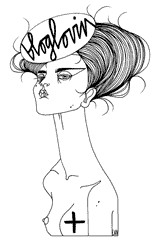The Volcano by Shusaku Endo
12 November, 2010
What a mount of heartache it is. A volcano resembles human life. in youth it gives reign to the passions, and burns with fire. it spurts out lava. but when it grows old, it assumes the burden of past evil deeds, and it turns as quiet as a grave.
So intones Professor Koriyama to Jinpei Suda, Section Chief of the the Weather Bureau, in Shusaku Endo’s novella, The Volcano. Like The Samurai, The Volcano is a meditation on man’s humanity, faith and the ties that bind him to others.
It’s Jinpei Suda’s retirement day from his job at the Weather Bureau. As he is forced to confront that the most important part of his life is over, he is also trying to realise his dream of publishing his research on Mount Akadaké, the volcano which has been at the centre of his working life and the city of Shirahama in which he lives. Known by his colleagues as the Demon of Akadaké because of his love of climbing the dormant volcano, Suda is reluctant to give up his ties with the volcano. In order to finance his publication, he finds himself providing professional assurance to City Councilman Aiba, a business man intent on building a hotel on Mount Akadaké to generate tourism and profit. As it tallies with his belief that Mount Akadaké is no longer active, this seems a perfect deal for Suda. However, at a meeting with the businessman, Suda suddenly has a stroke and is hospitalised. As his physical health crumbles, he slowly sees the cracks in his family life, his career and finally the realisation that his many years of volcanic research may not be entirely correct.
Running parallel to Suda’s story is that of Father Sato who runs the Catholic church in Shirahama and his errant predecessor, Durand, who was excommuniated 8 years earlier for being involved in a scandal. Father Sato is busy with his pastoral care and his pet project in building a retreat on Mount Akadaké. Durand, whose health is broken, is living pitifully at the hospital in the room next to Suda. Out of duty, Father Sato visits him two or three times a year, always leaving behind some money or food, but his distaste is obvious and Durand is no fool. As tremors are felt from Mount Akadaké, Durand feels that what has been brewing in the Church’s quest to evangelise a nation that thinks completely differently from Europeans with regard to the notion of sin will erupt just as sin cannot be erased from humanity.
Here, Endo is masterful in showing the disintegration of belief and the petty pride and fight for control that plague the Church in Japan. I don’t think it denigrates the Church in any way (as Endo himself was a practicing Catholic) but it shows the Church and its priests in a more human way. Belief comes with doubt and Endo deals with and questions it in a deep and probing manner. Endo also questions the notion of sin and how it is perceived by the Japanese whose idea of it differs greatly from Europeans. But it is not just the Christians who face difficulty when it comes to assessing their lives. What permeates Endo’s novel is the notion that human life is never what it seems and that what we perceive is our due may not be what we get.
As you can probably tell, I loved The Volcano. The translation by R.A. Schuchert was smooth, although there were some words that seemed old-fashioned and could have just been left in Japanese, but these are minor quibbles in what was a wonderful translation. There is a depth to Endo’s writing which didn’t come across as too serious or boring and I will definitely be reading more of his novels. Endo is fast becoming one of my favourite Japanese authors.
I read this for Dolce Bellezza‘s Japanese Literary Challenge 4.












12 November, 2010 at 4:43 pm
Sounds like a book that examines a lot of topics. It especially sounds interesting how it talks about sin and the church. I will add to my wish list 🙂
13 November, 2010 at 7:27 am
I ve yet to read endo ,would this be a good place to start ? ,all the best stu
13 November, 2010 at 3:15 pm
I really need to read some Endo! I have a few of his books on my shelf and just somehow haven’t gotten to them. Thank you for the reminder, and the lovely review.
13 November, 2010 at 4:41 pm
I really need to read Endo soon! I am looking forward to getting acquainted with his books and I imagine that I will love them. The religious aspect of his books should make for interesting reading as well.